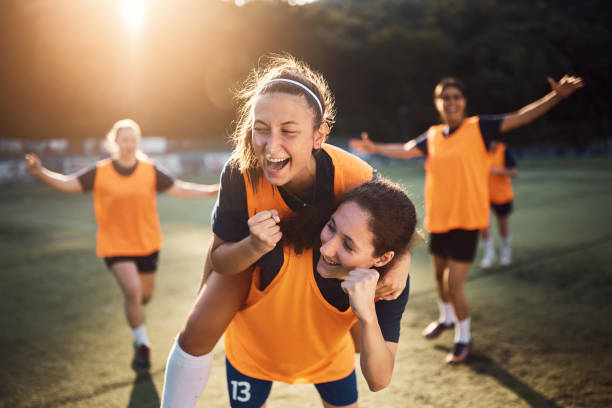
Performance anxiety is a common challenge faced by athletes across all levels of competition. It manifests as fear, nervousness, or overwhelming pressure that can negatively impact an athlete’s ability to perform at their best. Sports psychology plays a pivotal role in helping athletes navigate these mental barriers, enabling them to maintain focus, confidence, and composure during high-pressure situations.
Understanding Performance Anxiety in Sports
- Increased heart rate
- Sweating
- Shaking or jitteriness
- Difficulty concentrating
- Negative self-talk or self-doubt
While these responses are normal under stress, excessive anxiety can hinder performance by disrupting focus, coordination, and decision-making.
How Sports Psychology Addresses Performance Anxiety
- Cognitive Behavioral Techniques: Identifying negative thought patterns and replacing them with positive affirmations.
- Visualization: Rehearsing successful outcomes in the mind to build confidence.
- Mindfulness Training: Staying grounded in the present moment rather than worrying about future outcomes.
- Relaxation Techniques: Reducing physical symptoms of anxiety through progressive muscle relaxation or deep breathing exercises.
Strategies for Overcoming Performance Anxiety
- Focus on process-oriented goals (e.g., improving specific skills) rather than solely outcome-based goals like winning.
- Establishing consistent rituals before games or competitions helps create a sense of familiarity and calm.
- Replace statements like “I can’t do this” with empowering phrases such as “I am prepared and capable.”
- Techniques such as diaphragmatic breathing help regulate the nervous system during moments of stress.
| Symptom | Breathing Technique Recommendation |
| Racing Thoughts | Box breathing (inhale 4s, hold 4s, exhale 4s) |
| Muscle Tension | Progressive muscle relaxation combined with deep breaths |
| Rapid Heartbeat | Diaphragmatic breathing (slowly inhale deeply into the belly) |
- A trained professional can provide personalized strategies tailored to an athlete’s unique needs and competitive environment.
The Athlete’s Mindset Matters
Performance anxiety doesn’t have to undermine success in athletics. With dedication to mental conditioning alongside physical training, athletes can overcome these challenges through sports psychology principles that foster resilience, focus, and emotional control—empowering them to meet their full potential even under intense pressure.
Exploring the Impact of a Sports Psychologist New York City on Athletic Success
Sports psychology plays an integral role in helping athletes achieve their peak performance while maintaining mental well-being. It focuses on the psychological factors that influence sports, exercise, and physical activity. By addressing these factors, athletes can overcome mental barriers, enhance focus, and build resilience for long-term success.
Exploring Performance Psychology in New York City and Its Impact on Sports
- Mental Preparation: Developing pre-performance routines to enhance concentration and confidence.
- Stress Management: Teaching techniques to handle pressure during competition.
- Goal Setting: Helping athletes set realistic, measurable, and outcome-driven goals.
- Focus and Attention Control: Training the mind to avoid distractions during high-pressure situations.
- Mental Recovery After Setbacks: Guiding athletes through challenges such as injuries or losses without impacting long-term motivation.
How Sport Performance Training in New York City Can Benefit Your Mental Game
| Benefit | Description |
| Improved Concentration | Focused training helps reduce distractions during critical moments. |
| Enhanced Confidence | Positive reinforcement builds self-belief essential for optimal performance. |
| Better Stress Management | Techniques like visualization reduce anxiety before competitions. |
| Stronger Mental Resilience | Athletes learn to handle setbacks more effectively, maintaining motivation. |
| Increased Motivation | Aligning personal values with athletic goals fosters intrinsic drive. |
Effective Strategies from a Sports Mental Coach in New York City
- Athletes mentally rehearse successful performances.
- This helps create neural patterns that mimic actual execution of skills.
- Replacing negative thoughts with constructive affirmations improves mental outlook.
- For example: “I am prepared” instead of “What if I fail?”
- Simple rituals before competition (e.g., deep breathing, focusing exercises) bring consistency and calmness.
- Encouraging present-moment awareness reduces overthinking and enhances focus under pressure.
Exploring a Case Study in Sports Psychiatry in New York City
Consider a professional tennis player who struggles with nerves before high-stakes matches: – They begin working with a sports psychologist to implement relaxation techniques like diaphragmatic breathing. – Over time, they also practice visualization by imagining successful serves under pressure. – With sustained effort, they report reduced anxiety levels during matches and improved consistency in their game performance.
By addressing both the mental and physical demands of sport through tailored approaches, sports psychology enables athletes not just to perform better but also enjoy healthier relationships with their craft.
Enhance Your Game with Sports and Performance Psychology in New York City
Sports performance anxiety can significantly impact an athlete’s ability to perform at their best. It’s a common issue across all levels of athletic competition, from amateurs to professionals, and addressing it effectively requires both awareness and strategic interventions. Below, we explore actionable techniques that can help athletes combat performance anxiety and achieve improved results.
Recognizing Symptoms of Sports Performance Anxiety
- Physical symptoms: Sweating, rapid heartbeat, muscle tension, nausea, or shortness of breath.
- Cognitive symptoms: Negative self-talk, racing thoughts, difficulty concentrating, or fear of failure.
- Behavioral symptoms: Avoidance of competition, procrastination in training, or pre-game rituals stemming from superstition rather than strategy.
Understanding these signs allows athletes and their support teams to tailor interventions appropriately.
Proven Strategies to Combat Sports Performance Anxiety
- Reframe negative thoughts into positive affirmations (e.g., replace “I’m going to fail” with “I’ve trained hard; I’m ready”).
- Use imagery visualization by mentally rehearsing successful performances.
- Engage in mindfulness meditation sessions to stay present during practice and competition.
- Focus on immediate sensations—such as breathing or the feeling of the ground beneath you—to anchor yourself in the moment.
- Develop consistent warm-up routines that are calming yet energizing.
- Stick to habits that have proven effective but avoid overly rigid rituals that can induce stress if disrupted.
- Set realistic short-term goals for practices and competitions instead of fixating solely on long-term achievements like championships or personal records.
- Break major goals into smaller milestones for better focus during events.
- Communicate openly with coaches about fears or concerns regarding performance.
- Seek guidance from sports psychologists who specialize in managing competitive stress.
Practical Relaxation Techniques for Athletes
| Technique | Description | Benefits |
| Progressive Muscle Relaxation (PMR) | Involves tensing then relaxing each muscle group sequentially | Reduces physical tension |
| Controlled Breathing | Slow inhalation through the nose, hold briefly, exhale slowly through the mouth | Calms the nervous system |
| Guided Meditation | Listening to recorded scripts focusing on calmness or positivity | Improves mental clarity |
These relaxation methods can be particularly effective before high-stakes competitions.
The Importance of Self-Compassion
Athletes often hold themselves to exceptionally high standards. While striving for greatness is valuable, excessive self-criticism after mistakes can amplify anxiety over time. Practicing self-compassion involves acknowledging imperfections without judgment and focusing on learning opportunities instead of failures.
Examples include: – Journaling about lessons learned after games rather than dwelling on errors. – Reminding oneself that setbacks are temporary steps toward growth.
By implementing these strategies consistently, athletes can minimize the effects of sports performance anxiety while building confidence and resilience over time. Effective management not only enhances individual performances but also fosters a healthier relationship with competitive sports overall.
Mastering Performance and Sports Psychology in New York City for Better Results
Sports performance anxiety is a common challenge faced by athletes at all levels. It can affect physical performance, mental clarity, and overall confidence. Understanding how to combat this anxiety effectively can make a significant difference in achieving optimal results on the field, court, or any competitive environment. Below are actionable strategies grounded in sports psychology concepts that can help athletes manage and reduce performance-related anxiety.
Identifying the Signs of Performance Anxiety
The first step in combating sports performance anxiety is recognizing its symptoms. Early identification allows athletes to address and manage their stress before it impacts their performance.
Common signs include:
– Physical Symptoms: Increased heart rate, sweaty palms, muscle tension, nausea, or trembling.
– Cognitive Symptoms: Excessive worry about outcomes, fear of failure, difficulty concentrating, or negative self-talk.
– Behavioral Symptoms: Avoidance of competition scenarios or engaging in rituals that serve as coping mechanisms.
Effective Strategies to Manage Sports Performance Anxiety
- Practice visualizing successful performances before stepping into competition.
- Focus on positive outcomes and imagine yourself navigating challenges confidently.
- Establish a consistent pre-game routine that helps calm nerves and build focus (e.g., listening to music or stretching).
- Familiar rituals provide a sense of control and prepare the mind for success.
- Engage in mindfulness practices like meditation that help anchor awareness in the present moment.
- Techniques such as body scanning or focused breathing can reduce overthinking during high-pressure situations.
- Replace negative thoughts with affirmations such as “I am prepared” or “I am capable.”
- Interrupt unhelpful thought patterns by focusing on what you can control rather than what you cannot.
- Break large goals into smaller milestones to maintain focus during training sessions and competitions.
- Process-oriented goals (e.g., improving your swing technique) are often more beneficial than outcome-driven goals (e.g., winning every match).
Role of Breathing Techniques
| Breathing Exercise | Description | Benefit |
| Diaphragmatic Breathing | Inhale deeply through the diaphragm rather than shallow chest breathing; exhale slowly. | Promotes relaxation while reducing heart rate. |
| Box Breathing | Inhale for 4 seconds → Hold for 4 seconds → Exhale for 4 seconds → Hold again for 4 seconds. | Enhances focus under pressure. |
| Alternate Nostril Breathing | Close one nostril while inhaling through the other; alternate sides. | Balances nervous system response. |
The Importance of Professional Guidance
Athletes struggling with chronic sports performance anxiety might benefit from consulting a qualified sports psychologist who specializes in mental skills training. These professionals can employ evidence-based techniques like cognitive-behavioral therapy (CBT) tailored specifically to athletic contexts.
Sports psychologists also work collaboratively with coaches and support teams to create an environment where athletes feel supported both physically and mentally.
By implementing these strategies consistently, athletes are better equipped not only to overcome performance anxiety but also to thrive under competitive pressures while maintaining mental resilience over time.
Top Breathing Exercises for Sports Performance Coaching in New York City
Managing sports-related anxiety is crucial for athletes aiming to perform at their best. One of the most effective ways to address performance anxiety is through breathing exercises. Controlled breathing promotes relaxation, enhances focus, and helps regulate the body’s response to stress. Below are some top breathing techniques specifically designed for athletes.
Diaphragmatic Breathing
Diaphragmatic breathing, also known as belly breathing, focuses on using the diaphragm to take deep breaths. This technique helps reduce stress and lowers heart rate during high-pressure situations.
How to Practice: 1. Sit or lie down in a comfortable position. 2. Place one hand on your chest and the other on your abdomen. 3. Inhale deeply through your nose for four counts, ensuring your abdomen rises while your chest stays still. 4. Exhale slowly through your mouth for six counts, feeling your abdomen fall. 5. Repeat for 5-10 minutes before practice or competition.
Benefits: – Improves oxygen flow throughout the body. – Reduces tension in muscles and promotes relaxation. – Enhances focus by calming racing thoughts.
Box Breathing
Box breathing is a simple yet powerful technique used frequently by athletes and professionals in high-stress environments.
How to Practice: 1. Inhale through your nose for a count of four. 2. Hold your breath for four counts. 3. Exhale slowly through your mouth for four counts. 4. Pause without inhaling again for another four counts. 5. Repeat this cycle 5-7 times until you feel more centered.
Benefits: – Enhances mental clarity under pressure. – Reduces feelings of overwhelm during critical moments. – Stabilizes heart rate and blood pressure.
Alternate Nostril Breathing (Nadi Shodhana)
This yoga-based practice is excellent for balancing emotions and calming pre-performance nerves.
How to Practice: 1. Sit comfortably with a straight spine. 2. Use your thumb to close off one nostril while inhaling deeply through the open nostril. 3. Close the open nostril with your ring finger as you release the thumb from the other nostril, exhaling fully through it. 4. Continue alternating sides with each breath cycle for 3-5 minutes.
Benefits: – Promotes emotional balance and reduces stress hormones like cortisol. – Improves overall respiratory efficiency important during athletic performance.
The 4-7-8 Technique
This method is widely endorsed by health professionals as an effective way to manage anxiety quickly.
How to Practice: 1. Breathe in quietly through your nose for 4 seconds. 2. Hold that breath gently but firmly for 7 seconds without straining yourself. 3. Slowly exhale completely through pursed lips over an 8-second duration while making a soft ‘whooshing’ sound if comfortable doing so.
Benefits: – Instills calmness almost instantly when used correctly in dire need scenarios pre-game jitters etc..
TABLE Example Showing Quick Timeframe Impacts amongst beginner-level psychy implementing Each routine Tracked avg markers`
Exploring Sports Performance Psychology in New York City: Overcoming Anxiety and Athletic Challenges
Athletic performance is not solely dictated by physical training and natural talent. Mental health and emotional factors, particularly anxiety, play a significant role in determining an athlete’s success. Anxiety can manifest as a barrier to optimal performance, creating challenges that often go unnoticed or unaddressed. Understanding the connection between anxiety and athletic performance is key to addressing these issues effectively.
How Anxiety Affects Athletic Performance
Physical Effects: – Increased heart rate – Muscle tension – Fatigue – Shortness of breath or hyperventilation – Difficulty coordinating movements due to heightened nervous system activity
Mental Effects: – Negative or intrusive thoughts (“What if I fail?”) – Reduced focus and concentration – Overthinking simple tasks or strategies – Fear of failure or judgment from peers, coaches, or spectators
When left unmanaged, these symptoms can significantly impair an athlete’s ability to perform at their best.
Types of Anxiety in Sports
- Refers to an individual’s predisposition to perceive situations as threatening.
- This type of anxiety is often long-term and deeply rooted.
- A temporary emotional response triggered by specific situations, such as an upcoming competition.
- Tends to peak right before the event and may subside once the event is underway.
Understanding whether an athlete struggles with state anxiety, trait anxiety, or both can help in determining the right interventions.
Common Athletic Performance Challenges Caused by Anxiety
- Anxiety can cloud judgment and lead to poor decision-making during crucial moments in a game.
- Persistent worry about failure erodes self-belief over time, causing athletes to second-guess their abilities.
- Athletes may perform well during practice but struggle during competitions due to heightened pressure and fear of failure.
- Chronic stress caused by unmanaged anxiety may lead to physical and mental exhaustion over time.
Strategies for Managing Anxiety in Athletes
- Consistent routines help establish a sense of control over competitive environments.
- Imagining successful outcomes helps reinforce confidence and reduces pre-game jitters.
- Slow breathing techniques calm the nervous system (e.g., diaphragmatic breathing).
- Focus on controllable actions rather than results (e.g., “improve my passing accuracy” instead of “win the game”).
| Technique | Benefits | Example |
| Deep Breathing | Reduces physical tension | Practice inhaling deeply for 4 seconds |
| Positive Self-Talk | Builds confidence | Replace “I can’t” with “I will” |
| Progressive Muscle Relaxation (PMR) | Lowers muscle tension | Systematically tense/relax muscles |
By proactively identifying symptoms of anxiety and implementing tailored strategies like those above, athletes can better manage its impact on their performance while building resilience for future challenges.
Boost Your Performance with a Sports Mental Therapist in New York City
Mental resilience is a crucial factor in an athlete’s ability to perform at their best, particularly under pressure. Sports psychology provides a range of strategies and techniques designed to strengthen mental resilience, enabling athletes to handle challenges, setbacks, and high-pressure environments more effectively. Below are some key techniques used in sports psychology that athletes can adopt to bolster their mental toughness.
Visualization and Imagery
One of the most widely used tools in sports psychology is visualization. This involves mentally rehearsing a performance or specific actions in vivid detail to prepare for real-world scenarios. It helps athletes build confidence and reduce anxiety while improving focus.
- Find a quiet, distraction-free space.
- Close your eyes and imagine yourself performing at your best.
- Focus on sensory details — what you see, hear, feel, and even smell during the performance.
- Regularly practice these mental rehearsals before competitions.
By visualizing success repeatedly, athletes can train their minds to expect positive outcomes and remain composed under pressure.
Goal Setting
Setting clear, achievable goals is another technique that fosters mental resilience in athletes. Goals provide direction and purpose while helping focus the mind on tasks that lead to overall improvement.
- Outcome Goals: Focused on results (e.g., winning a championship).
- Performance Goals: Target specific achievements (e.g., improving running speed by 5%).
- Process Goals: Concentrate on techniques or habits (e.g., practicing proper breathing during training).
Athletes should break larger goals into smaller milestones, making them easier to track and accomplish over time.
Self-Talk Management
The way athletes speak to themselves internally can significantly impact their performance and emotional state. Positive self-talk fosters confidence, while negative self-talk can undermine progress.
- Examples of Positive Self-Talk:
- “I’ve prepared for this moment; I can do it.”
- “Breathe deeply; stay focused.”
- “Mistakes happen — keep moving forward.”
To improve self-talk habits: – Recognize negative thought patterns. – Replace them with constructive affirmations. – Practice this consistently during both training sessions and competitions.
Mindfulness Training
Mindfulness involves staying present in the moment without judgment. For athletes who face distractions or anxiety during high-stakes events, mindfulness training enhances focus while reducing stress levels.
Simple Mindfulness Techniques for Athletes: 1. Focus on your breath for two minutes — inhale deeply through your nose; exhale slowly through your mouth. 2. Use body scans to become aware of physical sensations without reacting. 3. Practice gratitude by reflecting on aspects of your sport you enjoy or value.
Mindfulness cultivates clarity of thought, emotional regulation, and overall composure in challenging situations.
Developing Coping Mechanisms
Resilient athletes are equipped with coping mechanisms that help them face adversity head-on without becoming overwhelmed. Common coping strategies include: – Seeking support from coaches or teammates when needed. – Reframing failures as learning opportunities rather than defeats. – Establishing pre-performance routines that create consistency before games or events.
A combination of these approaches ensures that setbacks don’t derail progress but instead serve as stepping stones toward growth.
| Technique | Benefit |
| Visualization | Builds confidence and prepares mind for challenges |
| Goal Setting | Provides structure for gradual improvement |
| Self-Talk Management | Encourages positivity and focus |
| Mindfulness Training | Reduces stress; enhances concentration |
| Coping Mechanisms | Strengthens ability to handle setbacks effectively |
By integrating these sports psychology techniques into regular practice routines, athletes can develop stronger mental resilience over time — an essential component not only for excelling in their sport but also for navigating life’s broader challenges with poise and determination.
Enhance Mental Resilience with a Sports Psychologist Near Me
Mental resilience is a critical component of athletic success, enabling athletes to overcome challenges, maintain focus under pressure, and recover from setbacks. Sports psychology offers a range of evidence-based techniques to help athletes develop and strengthen their mental resilience. By incorporating these strategies into training and competition, athletes can improve both their mental toughness and overall performance.
Key Techniques in Sports Psychology for Building Mental Resilience
- Break long-term goals into smaller, achievable milestones.
- Use the SMART (Specific, Measurable, Achievable, Relevant, Time-bound) framework to create actionable plans.
- Track progress regularly to maintain motivation and focus.
- Practice mental imagery by envisioning yourself successfully completing a task or competition.
- Focus on all sensory details—sights, sounds, feelings—to make the visualization as vivid as possible.
- Combine visualization with relaxation techniques to reduce stress levels.
- Engage in mindfulness exercises such as meditation or body scanning to stay present in the moment.
- Use deep breathing techniques to refocus attention when distractions arise during practice or competition.
- Develop the ability to accept negative thoughts without judgment and redirect attention toward productive actions.
- Replace self-critical statements with constructive affirmations (e.g., “I can adapt” instead of “I can’t handle this”).
- Create a list of positive phrases that reinforce confidence and repeat them regularly.
- Practice reframing negative experiences as opportunities for growth.
- Identify unhelpful thought patterns that may lead to self-doubt or fear of failure.
- Challenge irrational beliefs by evaluating evidence for and against them.
- Replace harmful thoughts with balanced perspectives that foster resilience.
Benefits of Mental Resilience for Athletes
| Benefit | Description |
| Enhanced Focus | Helps athletes stay concentrated during high-pressure situations. |
| Faster Recovery | Supports emotional rebound after mistakes or losses. |
| Better Stress Management | Reduces the impact of anxiety on physical and mental performance. |
| Improved Adaptability | Equips athletes with tools to handle unexpected challenges effectively. |
Practical Tips for Incorporating These Techniques
- Integrate Into Routine: Dedicate time each day for mental training exercises alongside physical practice sessions.
- Work With Professionals: Collaborate with sports psychologists or coaches skilled in mental skills training.
- Monitor Progress: Keep a journal to document improvements in mindset, focus, or performance under stress.
Developing mental resilience requires consistent effort but yields long-lasting benefits that extend beyond sports contexts. By applying these tools consistently, athletes can better navigate pressure-filled situations while maintaining confidence and composure throughout their careers.
- Sport Performance Training in New York City: Top Athlete Recovery Tips with Physical Therapy
- Sports Counselling New York City: Overcoming Performance Anxiety Through Psychology
- The Benefits and Challenges of Working as a Sports Psychologist New York City
- Exploring the Benefits of Sports Counselling New York City for Athletes
- How a Sports Psychologist New York City Can Transform Athletic Performance
- How Sports Counselling New York City Benefits Athletes and Enhances Performance
- The Benefits of Sports Counselling New York City for Athletes Thriving Under Pressure








